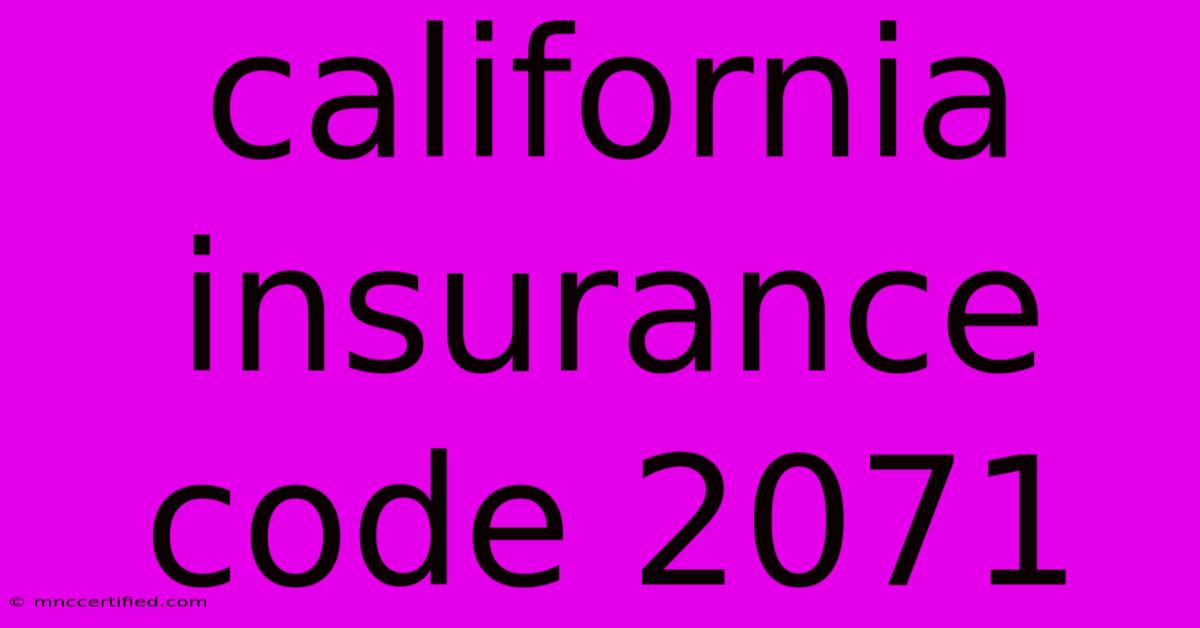California Insurance Code 2071

Table of Contents
Understanding California Insurance Code Section 2071: Unfair Practices
California Insurance Code Section 2071 defines and prohibits unfair methods of competition and unfair or deceptive acts or practices in the business of insurance. This crucial section is a cornerstone of consumer protection within the California insurance market, ensuring fair treatment and preventing manipulative tactics by insurers. Understanding its implications is vital for both consumers and insurance professionals.
What Does California Insurance Code Section 2071 Cover?
Section 2071 is broad in its scope, encompassing a wide range of potentially harmful practices. It doesn't list specific examples exhaustively, instead focusing on the general principles of fairness and honesty. However, case law and interpretations have established several key areas covered under this section. These include, but are not limited to:
Misrepresentation and False Advertising:
This is perhaps the most frequently cited aspect of Section 2071. Misrepresenting policy terms, benefits, or coverage is strictly prohibited. This includes making false or misleading statements in advertising, sales presentations, or policy documents. Exaggerating the benefits or downplaying limitations are also considered violations. Insurers must present information accurately and transparently.
Unfair Claim Settlement Practices:
Section 2071 prohibits insurers from engaging in unfair claim settlement practices. This encompasses a variety of actions, such as:
- Unreasonably delaying claims investigations or payments: Prolonged delays without valid justification can constitute a violation.
- Denying claims without proper investigation: Insurers must thoroughly investigate claims before making a decision.
- Requiring excessive documentation: Demanding an unreasonable amount of documentation from claimants can be viewed as obstructive.
- Low-balling settlement offers: Offering significantly lower settlement amounts than the actual value of the claim is a common violation.
- Using intimidation tactics: Pressuring claimants to accept unfavorable settlements through intimidation or harassment is unacceptable.
Discrimination:
Section 2071 prohibits insurers from discriminating against applicants or policyholders based on factors unrelated to risk assessment. This includes discrimination based on race, religion, national origin, sex, sexual orientation, gender identity, marital status, or age (except for legally permissible age-based distinctions).
Other Prohibited Practices:
The section also prohibits other unfair or deceptive practices, including:
- Boycotting, coercing, or intimidating other insurers or agents.
- Engaging in false or misleading comparisons with competitors.
- Failing to disclose material information to policyholders.
Penalties for Violating California Insurance Code Section 2071
Violating Section 2071 can result in significant consequences for insurers, including:
- Cease and desist orders: The California Department of Insurance (CDI) can issue orders requiring the insurer to stop the unlawful practices.
- Fines: Substantial fines can be levied against the insurer.
- Civil penalties: Insurers may face lawsuits from affected individuals or groups.
- Restitution: The insurer may be required to reimburse affected individuals for their losses.
- License revocation or suspension: In serious cases, the CDI can revoke or suspend the insurer's license to operate in California.
Protecting Your Rights Under Section 2071
If you believe an insurer has violated Section 2071, you should:
- Document everything: Keep records of all communications, including emails, letters, and phone calls.
- File a complaint: File a formal complaint with the CDI.
- Consult with an attorney: An attorney specializing in insurance law can advise you on your legal rights and options.
Keywords: California Insurance Code 2071, unfair insurance practices, California Department of Insurance, CDI, insurance claim, misrepresentation, unfair claim settlement, discrimination, insurance law, consumer protection, California insurance, insurance fraud.
This article provides general information and should not be considered legal advice. Always consult with a qualified legal professional for advice specific to your situation. The information provided here is for educational purposes only and should not be construed as a comprehensive guide to California Insurance Code Section 2071. Laws and interpretations may change, so it's important to consult up-to-date resources.

Thank you for visiting our website wich cover about California Insurance Code 2071. We hope the information provided has been useful to you. Feel free to contact us if you have any questions or need further assistance. See you next time and dont miss to bookmark.
Featured Posts
-
Country Girl Lainey Wilsons Spin
Nov 27, 2024
-
Citys Champions League Draw Dramatic Clash
Nov 27, 2024
-
Hack Disrupts Food Supply Supermarket Shelves Empty
Nov 27, 2024
-
Sporting Cp Arsenal Champions League Live
Nov 27, 2024
-
Tierney Arsenal Return January
Nov 27, 2024